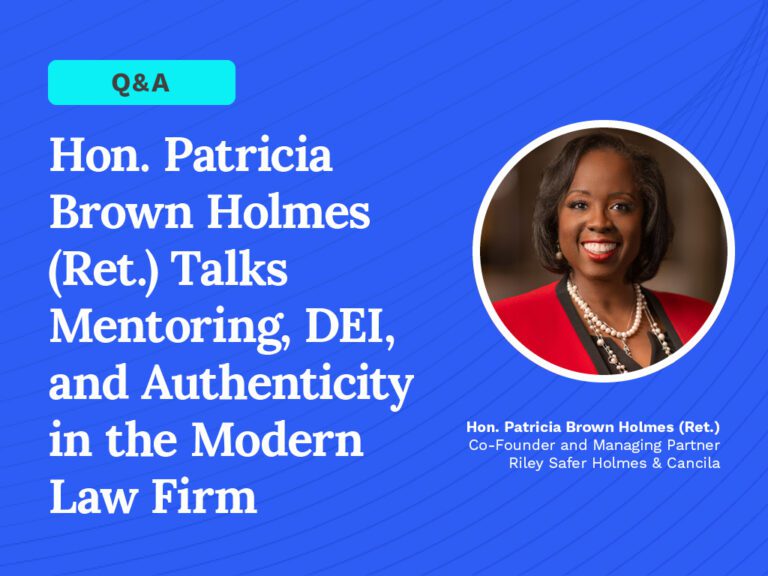Hon. Patricia Brown Holmes (Ret.) Talks Mentoring, DEI, and Authenticity in the Modern Law Firm
March 28, 2025

Hon. Patricia Brown Holmes (Ret.) is the Co-founder and Managing Partner of Riley Safer Holmes & Cancila. She is the first Black woman to lead and have her name on the door of a national law firm. A former federal prosecutor, she became the youngest Black associate judge in Cook County before transitioning to private practice.
In this interview, Hon. Patricia Brown Holmes (Ret.) discusses the importance of mentoring talent and diversity, equity and inclusion (DEI). She also stresses the need for authenticity in the modern law firm. Under her leadership, Riley Safer Holmes & Cancila prioritizes client needs over billable hours, with offices nationwide.
Acquiring and retaining talent is always a significant concern for a law firm. So, let’s begin by discussing your firm’s approach to recruiting new talent and what you believe are the key factors, especially in today’s landscape.
Patricia Brown Holmes: It’s an interesting question, and the answer is not as straightforward as one might think. Some believe recruiting talent means getting good lawyers and bringing them in the door. In the past, we simply looked for hardworking attorneys determined to get ahead. However, in today’s landscape, law firm leaders must think generationally.
Some generations in today’s workplace value their personal time just as much, if not more, than their job accomplishments. So, when we search for talent, we consider the individual as a whole — not only their legal experience and acumen. For example, one young lawyer might safeguard their time but is also quick to demonstrate a commitment to getting the job done.
Finding great talent isn’t easy, but we’ve been fortunate to find hard-charging individuals who understand the demands. They are competent, professional, and know how to serve our clients.
What indicators have you found that show someone will do the work and get the job done, even if they value a bit more work-life balance?
Patricia Brown Holmes: We ask about a person’s experiences when we conduct interviews. For example, “Tell me about a time when you were in a conflict. How did you resolve it?” “Tell me about a time when you achieved a goal. How did you accomplish that?” I’m looking for individuals who can multitask and succeed. We want someone who says, “You did it? I will do it too, and I will do it even better.”
In interviews, I also focus a lot on outside activities. I’m looking for someone who might say, “I volunteer weekly. I spend my weekends in a soup kitchen. I’m doing pro bono work. I’m tutoring high school kids.” We want a competitive spirit, but I’m also looking for a genuine human being who cares.
Authenticity is critical. We don’t want someone who walks in and gives the typical AI answers. I want to hear about your experiences, how you grew up, what your parents did. I want to know who you are and what motivates you.
We’ve talked about finding talent. What about retention? In the corporate world, hiring new employees is much more expensive than keeping current ones; however, many organizations prioritize recruiting new talent over retaining their top performers. What strategies do you use to keep your top talent?
Patricia Brown Holmes: Most law firms have two committees. One recruits people, and the other trains people. At Riley Safer Holmes & Cancila (RSHC), one committee manages both activities: our Recruiting and Associate Development Committee. That single group recruits and is responsible for talent development. Are our attorneys getting trial skills training? Are they getting business transaction training? Here, we have a “pathways to partner” program that coaches lawyers on business development and encourages them to take on responsibilities that will make them better professionals as they progress through their careers.
We also identify people who might not fit our firm well. Sometimes, people think they want to work in a private law firm, but it turns out not to be a fit for them. As leaders, you don’t necessarily need to or want to retain everybody you hire because it may not fit them or you. Be bold and authentic enough to identify that early on and know it’s okay. It doesn’t mean you failed.
This approach has led to some people getting bigger and better positions. We have one spectacular lawyer who really wanted to work in-house. So we helped her find a position, and now she wants to be a judge. I’m working with her on that so she can develop the career she wants.
For those who want to work in a big law firm or become owners, you want to be the person solving the firm’s most challenging problems. Then, we’ll ensure you have all the training, responsibility, and opportunities to achieve your dream.
So, it’s true mentorship from day one.
Patricia Brown Holmes: From day one in our firm, you’re assigned one mentor in your age category and one outside your experience category. So you’ve got a peer mentor, and then you have another role model mentor you can approach to say, “Here’s where I am now. And here’s where I want to be.” Reverend Jesse Jackson used to say this: “If you can see it, you can be it.” We’re showing you so that you can be it.
It’s a challenging time for diversity, equity and inclusion (DEI) in the country. How are you navigating that? How should other law firms approach it? What are some challenges, and why is it important to keep pushing forward?
Patricia Brown Holmes: Right now, in this meeting, there’s a white female, a black female, and a white man. That’s diversity. Period. You can’t get rid of it. So, if you accept the premise that DEI is synonymous with something negative, we’re doomed. We have to reject that. You cannot go back. You’ve got too many diverse families right now. That pot has already started to melt.
Even people who don’t like the concept of DEI have come to accept the customer base. Diversity only means having people in the room who don’t look like you, who don’t think like you, and who are not clones. Equity is all about opportunity. And inclusion is nothing more than saying, “Hey, come on in. There’s room.” Just because the three of us are in the same room doesn’t mean there’s no space for everybody to achieve. We can help each other succeed. That’s all inclusion is.
So, when you say we don’t want DEI programs, what are you really saying? When you say we don’t want illegal discrimination, I agree. We don’t want any unlawful discrimination. Absolutely. That’s the antithesis of our whole concept of ourselves as a nation. As many companies have discovered, the customer base of any product is diverse, and the job market is also diverse.
You can’t get rid of diversity. It’s here. You might not have equitable programs, but then people can sue you. And you can’t get rid of inclusion. It’s here.
You mentioned authenticity earlier. Can you talk about authentic leadership as a path to success and its role as a leader in a law firm?
Patricia Brown Holmes: It’s really important. Because if you show up as somebody you’re not, it eventually takes over. We only have one life to live, and I learned that as a cancer survivor. I was told I had six months to live, and I have now survived 26 years. And what that teaches you is that there are no do-overs. Any second you spend is a second that you’ll never get back. Time is the most valuable currency we have.
It’s one of those things where, when you’re living your life, don’t waste your time. Don’t waste it doing unpleasant things, things you don’t like, things you can’t stand, or things that make you feel bad. I recognize that anybody working for us is spending a third plus of their life with this family at RSHC.
And yes, we call it a family. While families may have issues, turmoil, and stress, this should be pleasant. It should be desirable. It should be fun. I want our attorneys and professional staff to wake up in the morning and not hate coming here. They should wake up knowing they’re going to be supported. They’re going to be loved. They’re going to have fun. I want them to say about our leadership, “They will help me be the best lawyer and client advisor I can be, and it will be great.”
Get the free newsletter
Subscribe for news, insights and thought leadership curated for the law firm audience.




